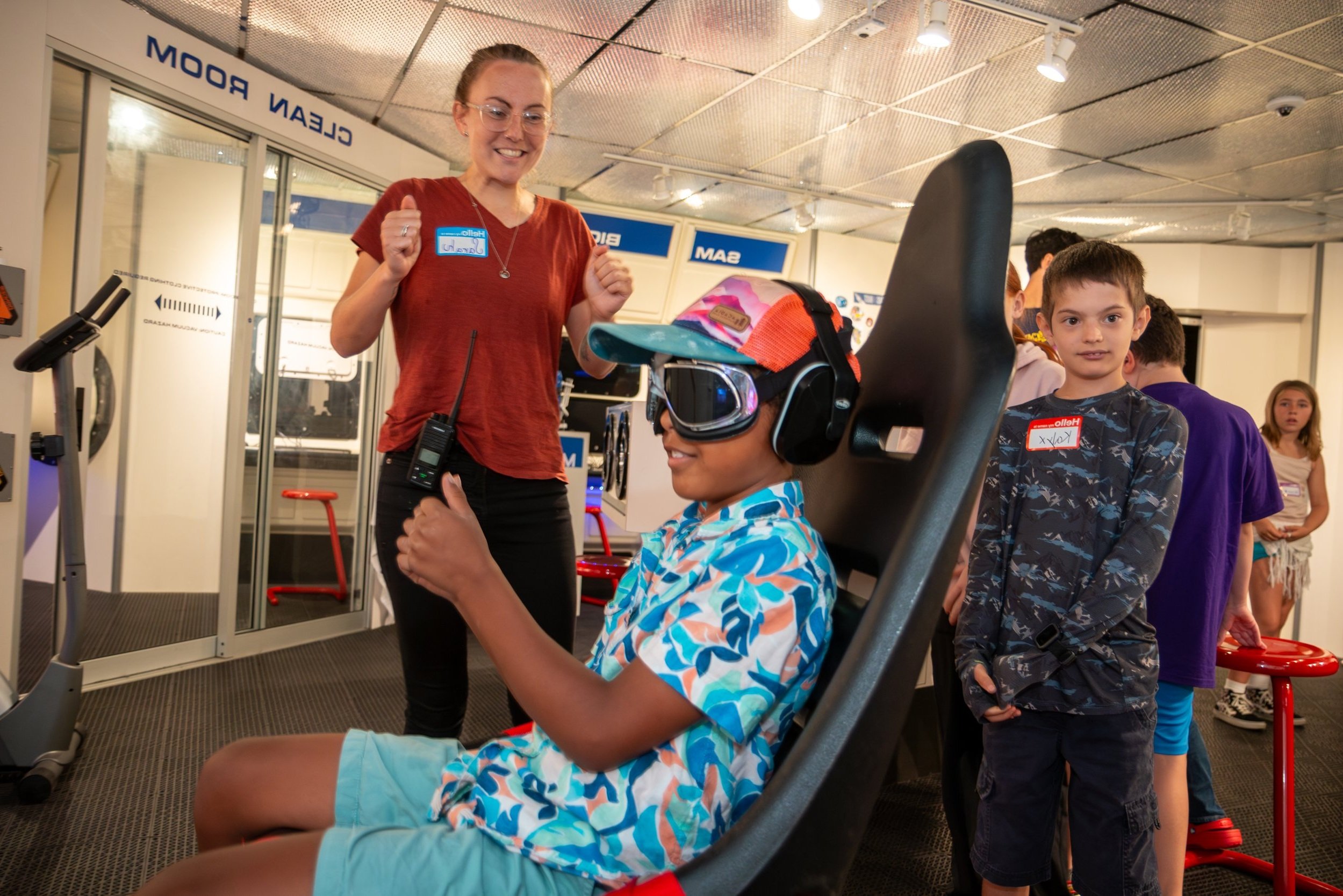PROGRAMS THAT IGNITE PASSIONS
When Quinn came to the Challenger Learning Center of Maine as a 6th grader, they recall not having much interest in science. But becoming a member of a crew making a simulated mission to the moon rocked their world.
“It was the highlight of my summer!” shared Quinn. “Landing on the Moon and using the Rover to explore was so much fun. I learned so much about space and how astronauts work with scientists and engineers to solve problems. It made me want to study harder in school so I can maybe work in space exploration someday.”
Our surveys show that about 80% of students who participate in Challenger Center programs say the experience has made them more likely to pursue STEM studies–and feel more confident that they can succeed.
All our programming, such as Lunar Quest that Quinn participated in, address three increasingly urgent educational challenges:
01) getting younger kids interested in and excited about STEM;
02) encouraging older students to pursue STEM skills into high school and beyond; and
03) exposing all students–regardless of their interest in STEM–to the value of being able to work in a team, communicate effectively, pursue their curiosity, and have confidence in their decision-making.
Our activities are carefully designed to augment traditional classroom activities, and to provide that extra spark that can ignite a lifelong passion for science and technology.
Challenger Maine is staffed by experienced teachers, scientists, and engineers who lead an array of in-person and virtual programs that meet national, state and local education standards, and are integrated into classroom STEM curricula.
At the core of our center is the five-room simulator that we are upgrading with your help.
It includes:
01) Briefing Room: used to brief and debrief students on their mission
02) Mission Control: patterned after modern spaceflight control rooms
03) Transport Room: space vehicle interior used to “launch” students to space
04) Spacecraft: replicates the interior of a modern space station
05) Airlock: the transition between the Transport Room and the Spacecraft
During our 1- to 2.5-hour programs–such as Operation Comet, Expedition Mars, Exploration Lab, and others–students role-play as mission controllers, scientists, engineers and astronauts. They perform the jobs of an actual NASA crew and support team as they follow procedures, solve problems, communicate effectively, and apply skills in reading, math, science, and engineering.
For elementary school students, the mystery and vastness of space captures their imaginations in a way that enables us to introduce a variety of STEM topics, from computer science to engineering, in a compelling manner. Extensive research has shown that it is key to reach students during this critical developmental window.
For older students, the hardware, software, and problem-solving tasks built into missions help introduce them to the idea that pursuing STEM knowledge can have tangible, practical applications and benefits. For example, they learn that people can earn a living designing, building, and applying such technologies, including in Maine’s emerging aerospace industry. Most of all, our students–especially those from Maine’s rural and underserved communities–gain new understanding about their interests and future potential.
For families, the Center’s after school and summer programs provide a fun way to build on what kids learn during the school year. Many parents say the programs help ignite and sustain their child’s interest in STEM over summer breaks.
GROWING DEMAND FOR OUR PROGRAMS
The vast majority of our programs serve students in Maine. The heart of Challenger’s program truly is the in-person mission simulation delivered to children from schools and youth organizations who come to our Bangor location on field trips. Yet Challenger Maine also reaches students–and adults–through various other ways, including virtual missions.
Virtual Missions in Maine...and Beyond
Our team members are invited into Maine classrooms virtually to provide STEM programming. Challenger virtual missions allow students to role-play as mission controls for Moon or Mars missions without leaving their classroom.
Of the 35 Challenger Centers in the country, we are one of only two asked to provide virtual programming to students in other states and even internationally. We have provided programming to groups in 10 other states and five other countries to date, most recently to middle schoolers in Scotland.
Other growing program offerings include:
Afterschool programs – Challenger Maine has been running STEM afterschool programs locally for over 10 years.
Offsite STEM modules – Challenger team members are invited to schools, rec groups and even libraries to provide great STEM programming modules focused on rockets, LEGO robotics, wind turbines, and even astronaut life.
Family STEM events – Challenger hosts four or more family STEM events at the Center each year. The events are available to the general public to enable families to experience STEM learning together.
Vacation STEM camps – Challenger hosts nine-plus weeks of sold-out vacation STEM camps to allow students to celebrate the excitement of STEM exploration during school vacations and all summer!
Adult programs – Challenger programming is not just for kids! Many community organizations and businesses use our programming for team building and training events. These fee-for-service programs help generate earned revenue that support all our programs in Maine.

“A visit is not a typical field trip. I receive training and materials to use in my classroom so students benefit before, during,
and after the missions. The most rewarding parts are the
team building, perseverance, and problem-solving
strategies my students learn.”
— Katie Miller, 5th Grade Teacher
Brewer Community School



